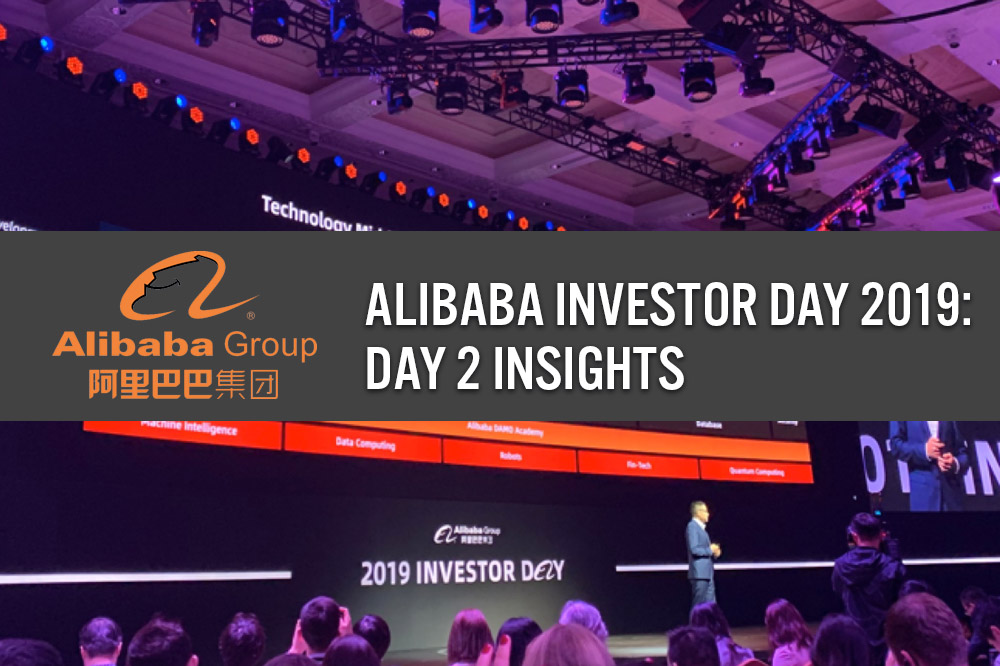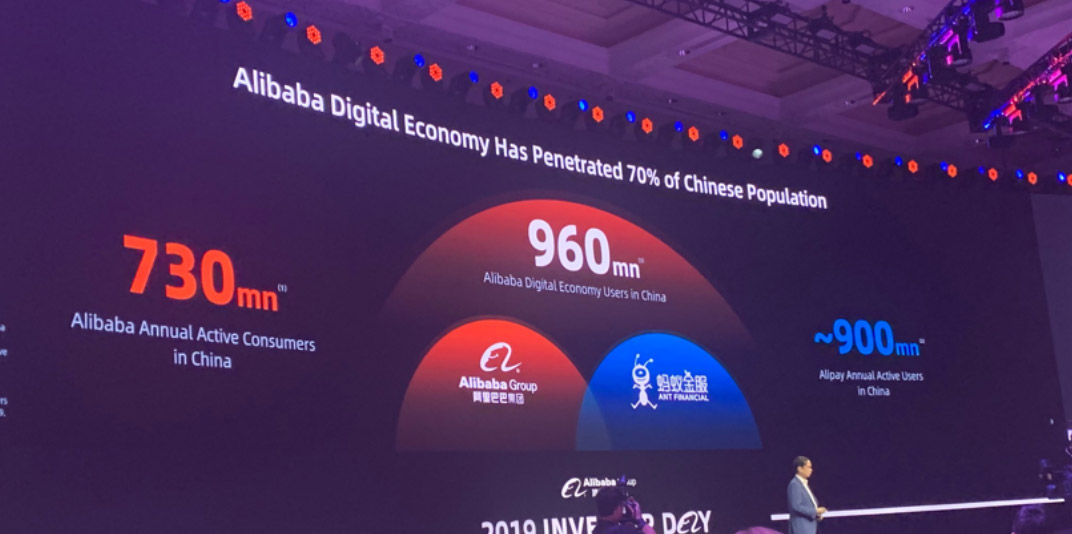
DIpil Das
Cloud and Technology
Zhang Jianfeng, Chief Technology Officer and President of Alibaba Cloud Intelligence, shared how cloud and technology play essential roles in what Alibaba calls its “digital economy.” Supported by the company’s technology infrastructure, including machine learning, data computing, robots and fintech, Alibaba developed databases and systems to support its business unit and client business needs.- Zhang emphasized one key strategy is the data middle office. The company has created a very strong data middle office platform which provides a point-to-point solution. It can help companies merge data and channel it to one screen to improve decision making efficiency. It can also unify a company’s data management and analysis across different teams to improve operational efficiency.
- Talking about the artificial intelligence of things (AIoT) and manufacturing self-driving cars, Zhang said Alibaba will focus on leveraging its technology and providing logistics solutions, warehouse management and last-mile delivery.
- Alibaba is the number one public cloud provider in China and the Asia Pacific region. In Asia Pacific, Alibaba Cloud focuses on providing a whole enterprise solution and enabling them to undergo digital transformation.
- Alibaba is actively building digital platforms to improve public services. For example, it is working with the government of Zhejiang province (just south of Shanghai) and has consolidated over 100 city municipality resources and combined 17.4 billion data entries. Alibaba is also working with the government of Macau to transform the city into a smart city.
- For retailers, Alibaba provides a data-driven business decision-making platform. For example, it has helped Li Ning, a sports brand company, to apply data middle office technology to aggregate real-time marketing, sales and service data from digitalized retail stores to generate consumer insights and develop business analysis. It also helps retailers leverage data for channel planning and intelligent product distribution across regions.
 Source: Coresight Research[/caption]
Source: Coresight Research[/caption]
Digital Media and Entertainment
Alibaba’s digital entertainment business seeks to provide “spiritual food” for Chinese consumers and plays a unique role in the company's ecosystem through targeted marketing and online-offline integration.Alibaba has invested in, coproduced and distributed eight of the top 10 best selling movies, following what it calls guidelines around “small, true, big and positive.”
- “Small” means investing in works that promote “small ordinary figures” with whom ordinary consumers can resonate, such as Dying to Survive, which was a top-selling movie in China.
- “True” means investing in “Chinese heroes” who represent justice and truth, such as Wolf Warriors.
- ”Big” means having a big sentiment for the world, for examples investing in The Wandering Earth.
- “Positive” represents a positive attitude, love and passion towards life, such as investing in Street Dance of China.
- Damai.cn, an entertainment ticketing platform and "comprehensive entertainment brand," which provides live performance and show tickets, such as concerts, musicals, music festivals, Peking opera, etc.
- Youku, a video hosting service provider and a subsidiary of Alibaba, has secured the rights to broadcast copyrighted TV programming. Through big data, Youku notes that consumers are interested in classic TV shows, even those popular 10-15 years ago, such as Friends. So, it purchased the rights to show those programs and re-launched with an HD version. Since then, Youku has gained a huge fans base. Youku has also-launched self-produced reality shows, such as Street Dance of China.
- lark.yuekeyun.com, a platform that serves 3,500 movie theatres, has a 50% market share and enhances their efficiency.
- Deng Ta, a platform that serves film promotion companies, delivers a new way of promoting movies based on insights, marketing and big data tracking. One example is that the platform adapted the global version of promoting the movie Capernaum. Based on the preference and insights of Chinese consumers, it suggested a new Chinese version of the movie’s poster, naming and way of promotion – the global version is gloomier, while the Chinese version is warm and touching. It has helped the movie to achieve US$54 million in box office receipts – compared to just $1.6 million in North America.
Ant Financial
Jing Xiandong, CEO and Chairman of Ant Financial, shared how Ant Financial leverages consumer insights and technology innovation to address the needs of consumers and merchants. Ant Financial’s open platform model allows it to provide other services including insurance, micro-financing and wealth management. Its Alipay now has 900 million active users in China and 1.2 billion worldwide users, combined with local wallet partners. Merchants can leverage data gained from Alipay for personalization and targeted marketing. With the huge consumer base, Ant Financial is able to attract more vendors and merchants into its network, providing a wide range of services to consumers.
[caption id="attachment_97094" align="aligncenter" width="700"] Source: Coresight Research[/caption]
Ant Financial aims to build a digital global payment network which consumers and merchants can easily access. Currently, Alipay integrates with nine local wallet partners. Consumers can use Alipay in online and offline stores across 56 markets worldwide. Merchants, particularly entrepreneurs and small and medium-sized businesses, can sell products globally and receive cross-border payments seamlessly through Alipay. Combined with other Alibaba platforms such as its online travel platform Fliggy, Tmall International and Cainiao, Ant Financial can create an inclusive cross-border e-trade platform.
Ant Financial’s blockchain technology also enables individuals, companies and financial institutions to improve transparency, security, efficiency and circularity in digital asset flow and transactions. Alibaba announced it now owns a 33% of share in Ant Financial, which will further grow Alibaba’s Digital Economy.
Source: Coresight Research[/caption]
Ant Financial aims to build a digital global payment network which consumers and merchants can easily access. Currently, Alipay integrates with nine local wallet partners. Consumers can use Alipay in online and offline stores across 56 markets worldwide. Merchants, particularly entrepreneurs and small and medium-sized businesses, can sell products globally and receive cross-border payments seamlessly through Alipay. Combined with other Alibaba platforms such as its online travel platform Fliggy, Tmall International and Cainiao, Ant Financial can create an inclusive cross-border e-trade platform.
Ant Financial’s blockchain technology also enables individuals, companies and financial institutions to improve transparency, security, efficiency and circularity in digital asset flow and transactions. Alibaba announced it now owns a 33% of share in Ant Financial, which will further grow Alibaba’s Digital Economy.
Alibaba Group
Alibaba Group Executive Chairman and CEO Zhang Yong presented the group’s strategy. Zhang replaced Jack Ma Yun as chairman of the board in early September. Zhang stated that Alibaba’s mission is “to make it easy to do business anywhere.” All company business units and services are integrated within one Alibaba Digital Economy; they share a common, huge user base and user population. Zhang emphasized that data is the core of Alibaba Digital Economy as it helps the group to form a closed loop: The real-time data generated by each of Alibaba’s companies can be returned to each of its business units. With Ant Financial, Alibaba expanded its user base to 960 million in China with a penetration rate as high as 70% in China. [caption id="attachment_97095" align="aligncenter" width="700"] Source: Coresight Research[/caption]
Source: Coresight Research[/caption]
- Alibaba has integrated Amap, its map and navigation service, into its infrastructure. Amap is relevant not only to individual users, but also an important tool for location-based services enterprises such as delivery companies.
- Alibaba also worked with Turkey’s leading e-commerce company Trendyol. The company started with a vertical apparel e-commerce platform. Today, it's evolved into a European supply hub for apparel.
- Alibaba is building a global fulfillment and delivery network with the combined efforts of Cainiao, Lazada, AliExpress, daras and Trendyol.
- Alibaba’s payment system, Alipay, has already worked with many local partners in different cities to develop local e-wallets and teamed up with local retailers to promote its e-wallet.
- Zhang said in the digital era, there is no difference between online and offline, the only difference is whether they have digitalized their businesses and captured data or not.
- Alibaba has been actively helping online and offline retailers, local service providers and merchants to digitalize their businesses, empowering them with data technology and helping them create value from data insights.
- Driven by New Retail, Alibaba sees highly integrated online and offline operations. For example, if an offline store’s orders, product offerings, payments, customers and in-store traffic is digitalized, the data generated is the same as having an online store. Zhang said Alibaba wants to help retailers digitalize their customer base and manage data across channels.
- At the same time, digital customer behavior helps Alibaba capture real-time customer needs and help merchants to quickly respond to changing customer needs.
- Alibaba is helping companies with digital marketing, channel management and datadriven product innovation. It helps brands incubate and develop new products through Alibaba insights.
- Alibaba has been investing in data capabilities and cloud infrastructures as they are relevant not only to Alibaba, but also to all the business that want to successfully digitally transform.
- By merging Alibaba’s commerce ecosystem and Alibaba’s cloud intelligence, Alibaba created a new Alibaba business operating system. Zhang believes the new system will bring Alibaba a new and unique value proposition. He thinks the unique element in the new operating system (as shown below) is that Alibaba provides business as a service.
 Source: Alibaba Group[/caption]
Wu Wei, CFO of Alibaba Group, said the purchasing potential among consumers in less developed areas of China represents 70% of new users. Alibaba data shows that a one-year Alibaba customer from a less developed area spends about ¥2,300 ($328) per year, but if the customer remains with Alibaba, after five years average annual spend climbs fourfold to ¥10,600 ($1,514).
Source: Alibaba Group[/caption]
Wu Wei, CFO of Alibaba Group, said the purchasing potential among consumers in less developed areas of China represents 70% of new users. Alibaba data shows that a one-year Alibaba customer from a less developed area spends about ¥2,300 ($328) per year, but if the customer remains with Alibaba, after five years average annual spend climbs fourfold to ¥10,600 ($1,514).